Sheep Slowly Making its way on to Belizean Plates
It’s been almost a decade since the Sheep and Goat Project was introduced in Belize by the Republic of China, Taiwan and Belize’s Ministry of Agriculture with the goal of expanding the sheep and goat industry and the project is still going strong. The sheep industry, while not comparable to Belize’s cattle industry in terms of consumption has displayed growth since the inception of the project and is still working its way up in numbers. In tonight’s episode of Belize on Reel, we take you to the Central Farm Agricultural Station in Cayo, where we learned why this project was implemented in Belize and how it has impacted the industry. Here’s News Five’s Britney Gordon with that story.
Britney Gordon, reporting
How many sheep do you think are in Belize currently? One thousand? Five thousand? Or perhaps a hundred thousand? In 2015, a head count indicated that there were ten thousand sheep officially in the country. And now, almost a decade later, that number has almost doubled to eighteen thousand sheep. At the Central Farm Agricultural Station, in Cayo, this small but important industry is thriving. And while lamb may not be the first thing that comes to mind when you think of a meal in Belize, for many farmers, their livelihoods depend on it. Elder Quewell, Field Manager of the Belize Sheep and Goat Project, tells us how the team has been working to get the industry going in the country.
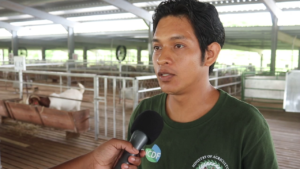
Elder Quewell
Elder Quewell, Field Manager
“The main objective is basically to provide farmers with pure bred sheep and goat so that they can improve their stocks.”
Britney Gordon
“So it’s to diversify the stocks that they have and have it be better quality. How has this affected the sheep industry in Belize?”
 Elder Quewell
Elder Quewell
“It has for example, it has increased the consumption, for example, from the starting point of the industry It was, consumption was zero point two nine and has incremented to one pound presently consumption of this. And it is continuing to expand as people get familiarized with the with the sheep.”
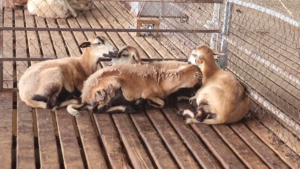 The consumption rate of sheep in Belize has tripled from zero point two nine pounds to one pound per person. But this change has occurred over a timespan of almost a decade. Quewell says that while the project is succeeding in growing the industry, he hopes that farmers would be able to access more opportunities as the industry continues to expand.
The consumption rate of sheep in Belize has tripled from zero point two nine pounds to one pound per person. But this change has occurred over a timespan of almost a decade. Quewell says that while the project is succeeding in growing the industry, he hopes that farmers would be able to access more opportunities as the industry continues to expand.
Britney Gordon
“Have you seen success in this project? Do people know about it? Are you seeing improvements in the breeds that people have?”
 Elder Quewell
Elder Quewell
“Yes, there are improvements, however there has to be more opportunities given to the farmers as well, right? Because if they are able to produce good quality, they also need to provide a doorway so that they can have access to market.”
Britney Gordon
“Do you anticipate this project will continue to grow? What’s the future looking like for this project?”
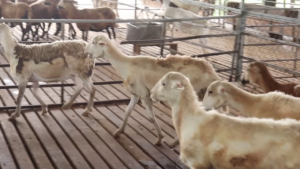 Elder Quewell
Elder Quewell
“From my perception I can see that people here in Belize are starting to familiarize with the consumption, right? And there is where the demand starts. So I’m thinking that if we put the initiative and we put more focus into what is the ship, then that will be part of what will be more expansion.”
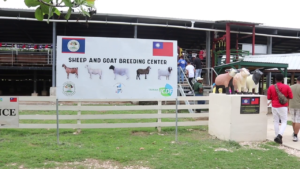 Aside from the sale of pure-bred sheep and goats, the team also assists farmers to better their stock through training sessions on how to prepare the feed for the animals, vaccinate and tag them and even how to properly prepare the meat in various dishes such as curry lamb. The preparation of this dish is taught to Belizeans across the country. The funding for this project came from the Republic of China, Taiwan, that has been a partner in this initiative since its inception in 2015. Next year, the Taiwanese government will be moving on to fund a different project. Benjamin Ma, a Sheep Project Specialist, tells us that giving Belize’s Sheep industry the opportunity to grow has been an important endeavor.
Aside from the sale of pure-bred sheep and goats, the team also assists farmers to better their stock through training sessions on how to prepare the feed for the animals, vaccinate and tag them and even how to properly prepare the meat in various dishes such as curry lamb. The preparation of this dish is taught to Belizeans across the country. The funding for this project came from the Republic of China, Taiwan, that has been a partner in this initiative since its inception in 2015. Next year, the Taiwanese government will be moving on to fund a different project. Benjamin Ma, a Sheep Project Specialist, tells us that giving Belize’s Sheep industry the opportunity to grow has been an important endeavor.
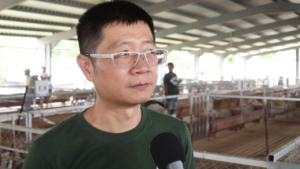
Benjamin Ma
Benjamin Ma, Sheep Project Specialist
“The Taiwan government is mostly funding this project and provide new technical to the sheep project. And I think mostly we are doing the breeding program more, because in Belize we don’t have the pure breed much so win this farm we provide one hundred percent pure. Three breeds, Katahdin, BBB, and the other Dorper.”
To ensure that the farmers have access to high quality sheep, the animals must be well taken care of. And for farmhand Misael Gonzalez, the wellbeing of these animals is a primary concern. He explains how the sheep are fed, vaccinated, groomed and loved by the workers.
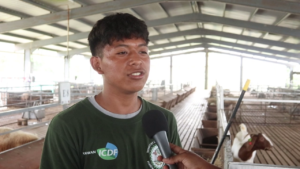
Misael Gonzalez
Misael Gonzalez, Farmhand
“In the morning when we come here and take a walk to check the barn, see if any animal is good, any animal is injured or something. And then we get the feed, which is here, grass, which we go harvest outside. So we get the feed and we start feeding in the morning before that. Then we check the water trough, the water from them, see if it is clean or it needs clean. If it’s dirty, we wash it and we clean it and everything. And then we milk the babies because they can’t drink from their mom or something. We milk them and that’s all. We just take care of the rest.”
 The job includes a list of responsibilities, however, Gonzalez says that being able to bond with the animals and help Belizean farmers gain access to quality sheep make the job fulfilling.
The job includes a list of responsibilities, however, Gonzalez says that being able to bond with the animals and help Belizean farmers gain access to quality sheep make the job fulfilling.
Britney Gordon
“Do you enjoy doing your job?
Misael Gonzalez
“Yeah, I enjoy it when I’m giving milk. Like the babies, they follow you and things like that. I just enjoy working here.”
 Britney Gordon
Britney Gordon
“So why do you think that this job is important?”

Misael Gonzalez
“This job is important because we help other farmers to get better breeds, to get better sheep. Let’s say if they want, they don’t have a type of breed, we can sell them and give it to them so they get better breeds and things.”
The industry still has a long way to go, nonetheless, it is on the way to becoming an integral part of Belize’s agriculture industry. Britney Gordon for News Five.






Facebook Comments